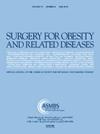再手术对减肥手术后腹痛影响的前瞻性研究:operation研究。
IF 3.5
3区 医学
Q1 SURGERY
引用次数: 0
摘要
背景:减肥手术(BS)后腹痛并不少见。许多病人需要再手术。有限的研究调查了BS后再手术治疗腹痛的结果。目的:评价BS术后腹痛患者再手术后的腹痛及生活质量。背景:荷兰减肥中心。方法:研究对象为BS术后因腹痛再手术的患者。患者在入组后、再手术后3个月和6个月分别完成腹部主诉和生活质量问卷调查。临床资料从记录中收集。根据术前临时诊断和术后诊断对患者进行比较。结果:共纳入179例患者,腹腔镜Roux-en-Y胃旁路术(86.0%),BS后中位时间为27个月[9.5-76.0]。再次手术6个月后,51.6%的患者仍有疼痛感。然而,观察到疼痛严重程度的下降(视觉模拟量表基线为83.50[75.0-95.0],6个月为0 [.0-44.0](P < .001)。术后未确诊的患者6个月后疼痛加重(P = 0.048)。所有患者的胃肠道生活质量指数均随时间改善(94-110)(P < 0.001);然而,在术前没有临时诊断的患者中,没有观察到明显的改善。所有患者的一般健康指标均下降(P < 0.001)。结论:BS术后再手术随访腹痛强度降低;然而,在大约一半的患者中,无论术后诊断如何,疼痛仍然存在,并且观察到一般健康指征的下降。这些发现强调需要综合管理策略来解决bs后疼痛和健康问题。本文章由计算机程序翻译,如有差异,请以英文原文为准。
A prospective study on the effect of reoperations on abdominal pain after bariatric surgery: the OPERATE study
Background
Abdominal pain after bariatric surgery (BS) is not uncommon. A number of patients require reoperation. Limited studies have investigated the outcome of reoperations for abdominal pain after BS.
Objectives
To assess abdominal pain and quality of life after reoperation in patients with abdominal pain after BS.
Setting
Bariatric center in the Netherlands.
Methods
The study involved patients with a reoperation for abdominal pain after BS. Patients completed questionnaires on abdominal complaints and quality of life after inclusion, 3 months, and 6 months after reoperation. Clinical data were collected from records. Patients were compared on the basis of preoperative provisional diagnoses and postoperative diagnoses.
Results
A total of 179 patients were included, with laparoscopic Roux-en-Y gastric bypass (86.0%), at a median of 27 months [9.5–76.0] after BS. Six months after reoperation, 51.6% continued to experience pain. However, a decline in pain severity was observed (visual analog scale baseline 83.50 [75.0–95.0] and 6 months 0 [.0–44.0] (P < .001). Patients without postoperative diagnosis had more pain after 6 months (P = .048). Gastrointestinal Quality of Life Index improved over time for all patients (94–110) (P < .001); however, no significant improvement was observed in patients without a preoperative provisional diagnosis. The general indication of health decreased for all patients (P < .001).
Conclusions
Abdominal pain intensity decreased during follow-up upon reoperation after BS; however, in approximately one half of the patients, the pain remained and a decline in general health indication was observed regardless of postoperative diagnosis. These findings underscore the need for comprehensive management strategies to address post-BS pain and well-being.
求助全文
通过发布文献求助,成功后即可免费获取论文全文。
去求助
来源期刊
CiteScore
6.70
自引率
12.90%
发文量
570
审稿时长
56 days
期刊介绍:
Surgery for Obesity and Related Diseases (SOARD), The Official Journal of the American Society for Metabolic and Bariatric Surgery (ASMBS) and the Brazilian Society for Bariatric Surgery, is an international journal devoted to the publication of peer-reviewed manuscripts of the highest quality with objective data regarding techniques for the treatment of severe obesity. Articles document the effects of surgically induced weight loss on obesity physiological, psychiatric and social co-morbidities.

 求助内容:
求助内容: 应助结果提醒方式:
应助结果提醒方式:


